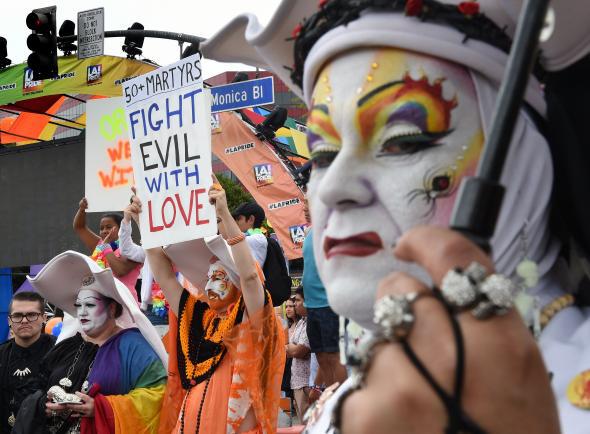On Sunday night, a few friends and I gathered over pizza and Sour Patch Kids to process our grief over that morning’s attack on a Latin-focused queer and trans party in Orlando. Some of us wept, some raged, and some sat quietly and listened. There was talk of inept politicians, the specter of rising Islamophobia, and our feelings of helplessness under the chokehold of the gun lobby. We hugged and strategized, wondering how we might start to heal.
Then one member of the group, who’d missed the weekend’s D.C. Pride festivities for a work obligation, asked, “Can I hear some Pride roses from y’all?” Roses, as opposed to thorns—the bright spots of beauty in a weekend meant to validate our existence and celebrate our chosen families. When confronted by an earthshaking, targeted attack that threatened her deepest sense of safety and home, my friend sought evidence of enduring happiness and queer affirmation. We shared our stories of the dance-floor antics, late-night mishaps, and magnificent outfits we cherished from the weekend. We relived our best moments; they strengthened us.
In the day-and-a-half since the Orlando attack, one of the worthiest traditions of LGBTQ liberation movements has come to the fore: turning responses to tragedy into celebrations of love and community. Sunday night’s Tony Awards offered one such opportunity for celebration as Hamilton, a musical written by a Latino man and cast with all people of color, swept the awards. Broadway has long been a welcoming home for queers—the awards show was a testament to the joy queers have brought to so many through theater and music.
There have been dozens of celebrations of local queer life across the country in the past day as communities have tried to find meaning in their mourning. At Parliament House, an Orlando gay club, 55-year-old drag queen Darcel Stevens made a heartfelt speech in plainclothes, then performed in full costume and makeup after a vigil. The marquee outside the bar read “Pulse Unbreakable.”
For many cities, the Orlando attack fell during Pride weekend, giving communities the chance to honor the victims and survivors of the Pulse massacre during their affirmations of LGBTQ identity. In Washington, D.C., Philadelphia, and Los Angeles, Pride festivities went on—people came for the party despite heightened security and a thwarted gunman in L.A., showing up en masse in the face of terror against LGBTQ and Latino people.
New Yorkers gathered at the Stonewall Inn, widely considered the birthplace of the modern LGBTQ rights movement, to share messages of courage and love.
Albuquerque Pride in New Mexico featured a performance of a Lakota warrior song in honor of those affected by the Pulse shooting. The New Mexico Gay Men’s Chorus attended the vigil to sing “Somewhere Over the Rainbow.”
A reliable symbol of the power of music and joy against oppression, gay singing groups all over the country have lent their songs to vigils and tributes since the Orlando massacre. The New York City Gay Men’s Chorus sang “Light” from Next to Normal on Good Morning America Monday morning.
The Gay Men’s Chorus of Washington, D.C. sang “We Shall Overcome” with a crowd in front of the White House on Sunday night.
At the Joy Metropolitan Community Church on Sunday, the Orlando Gay Chorus sang “True Colors,” backed by a full congregation.
Reporting from Orlando, NPR’s Ari Shapiro found residents slipping affirming messages under the windshield wipers of cars belonging to victims’ family members.
There have also been heartening moments of solidarity among members of marginalized groups grieving together. In D.C., the Muslim American Women’s Policy Forum is hosting a vigil against transphobia, homophobia, and Islamophobia, nodding to the specific needs of LGBTQ Muslims in the wake of the attack. “For Muslims who are observing Ramadan and are able to fast, we ask that you fast in solidarity with the victims and their families in Orlando,” organizers wrote on Facebook. On Sunday, leaders of Muslim and LGBTQ communities in Raleigh, North Carolina stood together to mourn the victims of Orlando.
This is when our queer networks are at their best—when they resist political efforts to misdirect our rage toward other people fighting against hate and fear; when they multiply queer strength with the power that comes from recognizing how our struggles intersect and feed into one another. Oliver Bendorf, a queer trans poet and activist living in Washington, D.C., has begun collecting scanned handmade flyers with messages of support, love, and disavowals of Islamophobia and racism. He’s making them all available online for printing and posting, calling it “another kind of social media.” During a time of hurt, anger, and violent bigotry in all its forms, finding space for love and joy is a radical way to heal.
